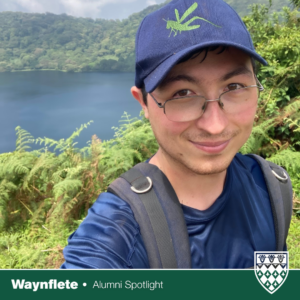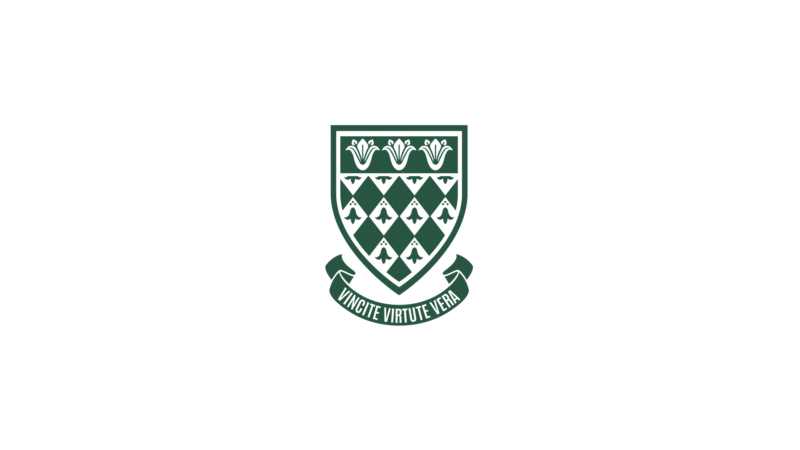Alumni Spotlight: Brandon Woo ’15
 In this brief interview, Brandon shares his love of the natural world, reflects on his college journey, and shares insightful advice for Waynflete students.
In this brief interview, Brandon shares his love of the natural world, reflects on his college journey, and shares insightful advice for Waynflete students.
Can you tell us about your college experience? What did you major in? How did Waynflete prepare you/impact your college career?
“I have always been interested in insects, so I started off college as an Entomology major. After a few years, I realized that I wanted to expand my knowledge to all areas of natural history, so I chose to pursue an Interdisciplinary Studies major that allowed me a lot more freedom in choosing coursework. This decision allowed me to become a well-rounded naturalist, as I took courses from mammalogy to ornithology to paleobiology, in addition to my entomology courses. The broad-scale, holistic education I received at Waynflete helped me to see a bigger picture and think outside the box to find the best option for my own learning during college. My time at Waynflete also taught me the value of diverse perspectives and learning from folks who come from different backgrounds. For most of my time in college, I lived in a themed ‘program house’ called the Ecology House. Unlike most other dorms, this one was composed of a mix of upperclassmen and first-year students and held themed events related to the environment. We all came from varied backgrounds, and we each had different interests and aspirations in life—yet, the dorm felt like a real community of friends, and we all learned from each other in many different ways.”
What are you passionate about? What inspires you and motivates you?
“I am passionate about insects and basically anything entomology-related, as anyone who knows me can attest. However, I am more broadly motivated by biodiversity and connecting people with the natural world. I see an endless parade of fascinating phenomena in nature and a never-ending well of questions to ponder. Best of all, this means that there is entertainment anywhere you go, even in cities. No matter where you live, there are unique birds, insects, wildflowers, and trees that can surprise and delight. These species form a part of our natural heritage, and it is my belief that in order to conserve nature, we must first appreciate and respect it. I strongly believe that the study of nature is for everyone, and to that end, I spend much of my free time volunteering on citizen science platforms such as iNaturalist, where people all over the world can submit photos of organisms and the community helps to arrive at the correct identification. These records become part of an enormous community science database, which provides data for a never-ending stream of scientific work related to biodiversity. Engaging with nature in this way is easy and fun, and it has the added benefit of contributing to science. It is something bigger than ourselves, but it is also a very personal experience—cataloging and learning about the insects and plants in your own backyard. As we are all aware, problems such as climate change and habitat destruction loom large, but I believe that cultivating a relationship with the natural world is one of the best ways for us as a species to appreciate what we have and strive to maintain it for future generations.”
Why does what you do (or what you are majoring/getting a graduate degree in) matter?
“My current graduate work is focused on the systematics and evolution of pygmy mole crickets, which are a group of very tiny insects that burrow in soft sand near water. The species that I study are found in a rare and restricted habitat type called Florida Scrub, a fascinating landlocked archipelago of dry, desert-like habitat occurring in the otherwise wet and muggy state of Florida. Most people have never heard of this habitat, much less the tiny insects that occur within it. Pygmy mole crickets are not economically important, nor do they impact human life much, if at all. So why does my work matter? The study of non-model organisms can lead to unique discoveries about how evolution works and help us to better understand phenomena such as convergence and adaptation.The Florida Scrub is filled with rare and endemic species, and thus any information on its inhabitants can be used for conservation purposes. But I think the most fundamental reason my work matters is more philosophical. The time of biodiversity exploration is far from over, and getting to know our tiny, unobtrusive neighbors is a truly human endeavor. Each bit of new information we discover is one more piece of the puzzle that is added to humanity’s collective knowledge about the world. If my work can shed some light on a group of insects about which nothing was known previously, I will feel like I have contributed something important.”
What do you love most about what you do?
“One of the things I love most about being in a graduate program is getting to interact with incredibly smart and creative people every day. From my major professor to my fellow graduate students and post-docs, everyone brings something unique and intelligent to the table—and we have fun! I also love fieldwork, and I am fortunate that my work allows me to get out into nature quite a bit.”
What advice would you give seniors who are trying to figure out what’s next for them?
“It’s okay to be unsure of where you’re going next, and don’t be afraid to change directions at various points along the way! I took a gap year halfway through college because I was feeling unsatisfied with how things were going. I needed to step back and really think about how I wanted to proceed. I took yet another gap year before beginning graduate school, and I gained some new skills and hobbies because of it. Spend time thinking about what makes you happy, and what kinds of activities motivate you. I believe that there’s always a way to make it work, even if it’s not obvious.”
“Coming from a place like Waynflete, where classes are small and interactions with teachers are a part of day-to-day life, it can be overwhelming to move into a college experience with thousands of students and no real interaction with most professors. It’s important to find a smaller community of friends with similar values so that you can support each other throughout the experience. Not everyone you meet in your first year will become your best friend, and that’s okay! Try some new things that might be outside your comfort zone. For an introvert like me, this can be extremely difficult, but it can lead to new friendships and interests—and if it doesn’t, there’s no shame in trying something else!”
“When it comes to pursuing graduate school, I have one very important message—pick an advisor who cares about their students’ success and works well with you. I have too many friends whose graduate school experiences were marred due to poor relationships with their advisors. Talk to their current and previous students if you want to really know what they are like as an advisor or as a person.”



